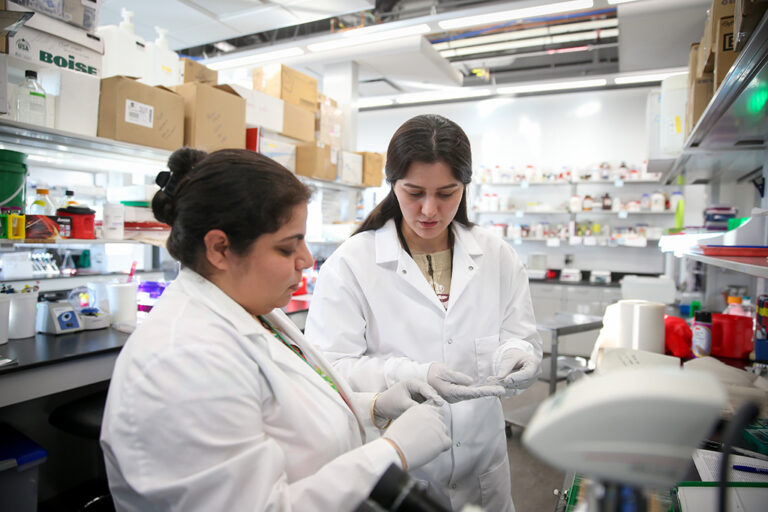UND’s Department of Biomedical Sciences first among similar departments to receive National Institutes of Health grants
The Department of Biomedical Sciences, housed within UND’s School of Medicine & Health Sciences (SMHS), has been listed was the No. 1 recipient of National Institutes of Health (NIH) grant dollars among comparable departments nationwide in fiscal year 2023.
As noted by federal grant tracking agency, the Blue Ridge Institute for Medical Research, the biomedical sciences team at UND came in first overall for NIH dollars awarded out of nearly 40 biomedical and basic sciences departments nationwide between July 1, 2022, and June 30, 2023.
Pulling in more NIH funding than similar departments at institutions such as Cornell University, the University of Pennsylvania, and the University of Minnesota, UND is the only Midwestern university listed in the Blue Ridge top five.
“We’d ranked highly on the Blue Ridge list for a few years now, and making it to number one is exciting,” said Chair of the SMHS Department of Biomedical Sciences and the School’s Associate Dean for Research, Colin Combs, Ph.D. “Hopefully we can keep the top slot this year as well.”
Major grants awarded to Department of Biomedical Sciences faculty in 2023 include:
- Holly Brown-Borg, Ph.D., was awarded a 5-year, $3,519,350 grant from the Hevolution Foundation for a project entitled “Cellular Mechanisms of Frailty Onset.” This project focuses on the underlying aging biology that leads to age-related dysfunction and disease.
- Xuesong Chen, Ph.D., was awarded two NIH grants in 2023: a 5-year, $2.3 million R01 award for a project titled “17α-estradiol and sex-differences in HAND with methamphetamine” and a 3-year $1.99 million RF1 award for a project titled “Intersection of HIV-1 Tat and SARS-CoV-2 S1 on neuroinflammation.” Both awards will help Chen continue his work to understand the molecular mechanisms whereby pathological changes in endolysosomes contribute to neurological disorders, including Alzheimer’s disease, HIV-1 associated neurocognitive disorders (HAND), and long-term neurological complications in COVID-19.
- Motoki Takaku, Ph.D., was awarded a four-year, $792,000 award by the American Cancer Society to continue his study of breast cancer. Takaku’s laboratory uses a combination of genomics, biochemistry, and gene editing techniques to study the basic mechanisms and cancer-specific functions of the components of cells that regulate the protein-DNA complex known as chromatin.
- Finally, Alexei Tulin, Ph.D., was awarded a $740,691 grant from the National Science Foundation to fund a project that extends his laboratory’s focus on the function of “PARP1” (specifically, poly(ADP-ribose) polymerase 1), a family of proteins involved in a number of cellular processes such as DNA repair, genomic stability, and cell death.
The biomedical sciences notwithstanding, SMHS-based researchers pulled in more than $34 million in 2022-23 from all external sources. Funding was used to support projects focused not only on neurodegenerative conditions like Alzheimer’s and Parkinson’s, but cancer, Indigenous health, age-related illness, and various infectious diseases, including influenza and SARS-CoV-2 (COVID-19).
Calling the report evidence of the hard work ongoing across the institution, School of Medicine & Health Sciences Dean Joshua Wynne, M.D., M.B.A., M.P.H., commended Combs and his group on their accomplishment.
“I am tremendously proud of how our team of researchers has continued to grow our School’s research portfolio, punching well above our weight class in many ways,” Wynne said. “This work not only helps us better understand the health conditions that afflict North Dakotans – it helps us get closer to more effective treatments and even potential cures for all of us.”



